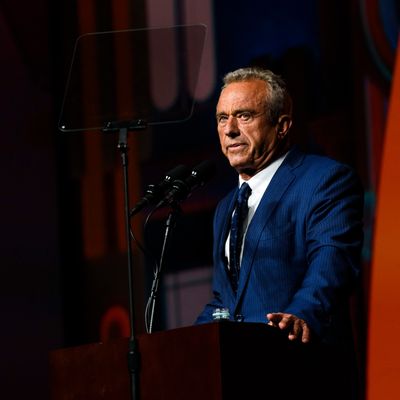
The long, strange trip of Robert F. Kennedy Jr.’s presidential campaign is about to come to an end: ABC News reports that he will drop out of the presidential race by the end of this week. He began as a dissident Democrat with eccentric views challenging Joe Biden. Then he became a high-profile independent battling to secure ballot access and steadily losing steam. And he could wind up in the MAGA camp of Donald Trump; several outlets reported that he’ll endorse the former president, but, Kennedy told ABC, “I will not confirm or deny that.” All we know for sure is that Kennedy is currently scheduled to be in the same city as Trump (Phoenix) on Friday, July 23, and that earlier this week his running mate (and the chief funding source for Kennedy’s campaign), Nicole Shanahan, spoke openly of “joining forces with Donald Trump” as an option going forward.
A suspension of Kennedy’s campaign might marginally help Trump against Kamala Harris. Recent polling shows Harris doing better in polls when non-major-party candidates are included. This is pretty logical, insofar as RFK Jr. was initially drawing support from a lot of the Democratic-leaning segments of the electorate (notably young and Latino voters) that appear to be returning to the Democratic column now that Harris is the nominee rather than Joe Biden.
On the other hand, Kennedy’s support has been dropping fast; he’s at 4.9 percent nationally in the FiveThirtyEight polling averages, after hitting over 10 percent as recently as late May. He is also on the ballot in only three of the seven key battleground states (Georgia, Michigan, and North Carolina). His favorability numbers have deteriorated steadily even as Harris’s and even Trump’s have improved: in those same polling averages, his favorable-unfavorable ratio went underwater in mid-May, and now stands at 34.1 percent favorable and 40.7 percent unfavorable.
Meanwhile, Harris is now steadily leading Trump nationally in head-to-head races without Kennedy or others (by 2.9 percent, per FiveThirtyEight), and all seven battleground states are very close. So while a Kennedy withdrawal might worry Democrats a bit, it shouldn’t really change the dynamics of the major-party contest other than on the very margins.
A Kennedy endorsement of Trump is a different proposition. It might dominate the news and step on any sort of post-convention “bounce” in the polls that Harris might have expected (though the expectations of that happening were relatively low). But it’s much less clear how much benefit Trump would get from the doughty conspiracy theorist going forward. It’s been pretty clear all along that a significant part of Kennedy’s support was based on having the most famous name in U.S. politics and was centered on low-information (and low-propensity-to-vote) folks who knew he was an alternative to Biden and Trump, but didn’t know much about his record or agenda. If RFK Jr. endorses Trump, he will be (and will be perceived as) just another noisy voice in the MAGA chorus. The Trump campaign may even need to marginalize him as someone with inconvenient views on issues ranging from abortion to climate change to Big Pharma.
For now, Trump seems cautiously positive about potential Kennedy support, per The Hill:
“I’ve known him for a long time. He’s, as you know, he’s a little different kind of a guy. Very smart guy. Very good person,” Trump said of Kennedy during a phone call with “Fox & Friends.”
The bottom line is that it’s unclear whether Kennedy has a significant base of support to deliver, and if he can in fact deliver it to Trump. But if nothing else, RFK Jr. moving into his camp, or even moving out of the way, will give the former president a moment of positive news to talk about after a post-RNC drought marked by bitter and erratic Trump commentary from the sidelines.
More on politics
- Trump Is Threatening to Invade Panama, Take Back Canal
- Everyone Biden Has Granted Presidential Pardons and Commutations
- What Happened to Texas Congresswoman Kay Granger?






























